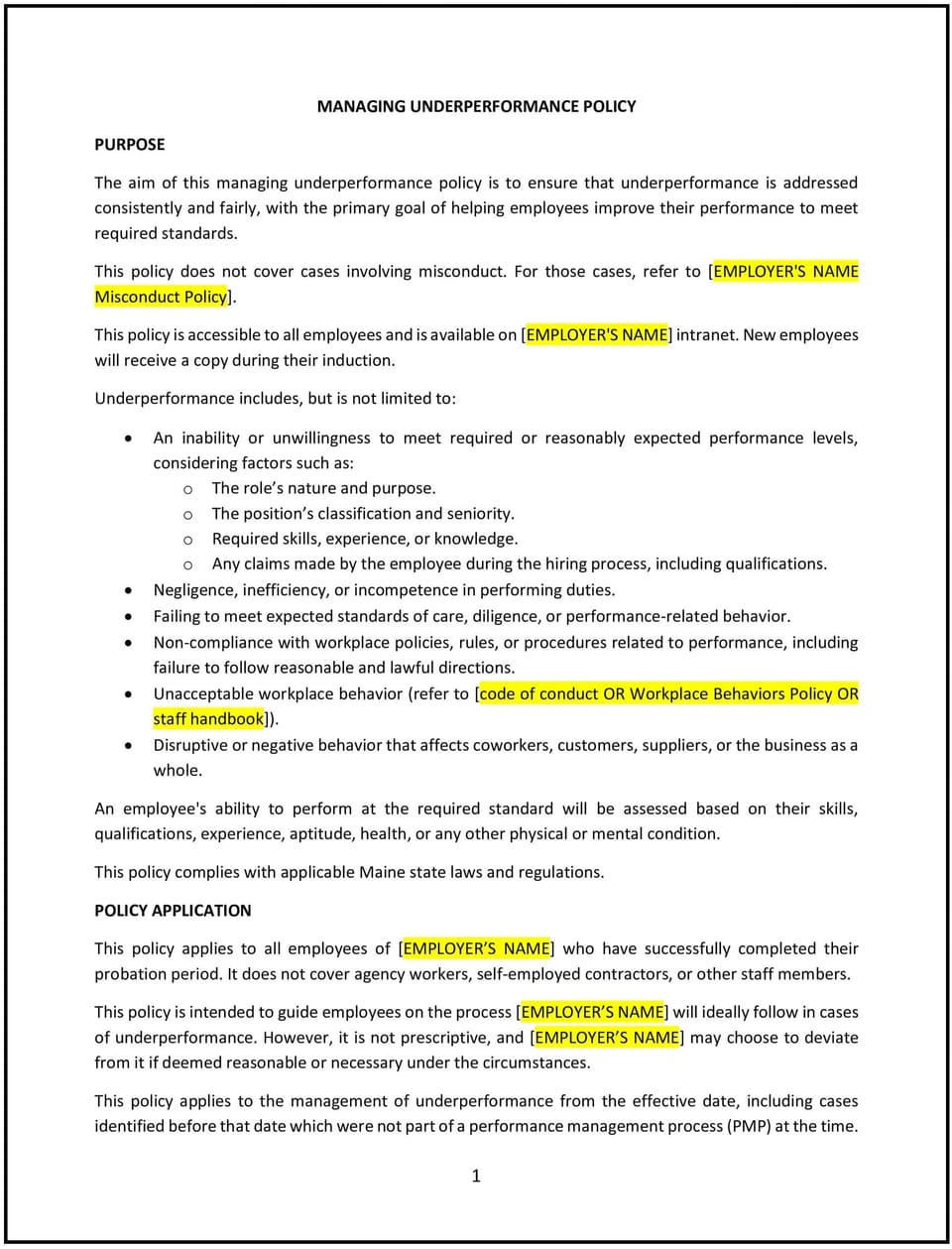Managing underperformance policy (Maine): Free template

Managing underperformance policy (Maine): Free template
This managing underperformance policy is designed to help Maine businesses establish clear procedures for addressing and improving employee performance issues. It outlines steps for identifying underperformance, providing feedback, and supporting employees in meeting expectations, while supporting compliance with Maine labor laws.
By implementing this policy, Maine businesses can promote fairness, improve productivity, and foster a supportive workplace culture.
How to use this managing underperformance policy (Maine)
- Define underperformance: Clearly outline what constitutes underperformance, such as not meeting job expectations, failing to achieve goals, or exhibiting unprofessional behavior.
- Establish early intervention: Encourage managers to address performance issues promptly through informal discussions before initiating formal procedures.
- Outline a performance improvement plan (PIP): Provide a structured approach for employees to improve, including clear goals, timelines, and support resources.
- Include feedback procedures: Detail how managers should provide constructive feedback, set measurable objectives, and monitor progress.
- Address training and support: Offer training, mentorship, or other resources to help employees address specific performance gaps.
- Specify consequences: Clearly state potential outcomes for unresolved underperformance, such as reassignment, demotion, or termination.
- Review regularly: Update the policy to reflect changes in Maine labor laws or workplace needs.
Benefits of using this managing underperformance policy (Maine)
Implementing this policy provides several benefits for Maine businesses:
- Promotes fairness: Ensures all employees are given a structured opportunity to address and improve performance issues.
- Enhances productivity: Helps employees meet expectations and contribute effectively to the business.
- Reduces turnover: Offers employees the support they need to succeed, improving morale and retention.
- Protects against legal risks: Ensures compliance with Maine labor laws and provides documentation for fair handling of performance issues.
- Strengthens communication: Fosters open dialogue between managers and employees about performance expectations and progress.
Tips for using this managing underperformance policy (Maine)
- Train managers: Provide training on how to recognize, address, and document underperformance fairly and constructively.
- Use clear metrics: Set measurable performance standards and ensure employees understand expectations.
- Maintain records: Document all discussions, feedback, and progress to provide accountability and transparency.
- Be consistent: Apply the policy uniformly across all employees to ensure fairness and avoid bias.
- Support employees: Provide access to resources such as training, mentoring, or counseling to address specific performance issues.
- Stay compliant: Monitor Maine labor laws to ensure the policy remains legally compliant.
Q: What is considered underperformance under this policy?
A: Underperformance may include failing to meet job responsibilities, consistently missing deadlines, or exhibiting unprofessional behavior.
Q: How should businesses address underperformance initially?
A: Businesses should start with informal discussions to identify the issue, provide feedback, and offer guidance before implementing formal measures.
Q: How often should businesses review their managing underperformance policy?
A: Businesses should review the policy annually or whenever there are updates to Maine labor laws or workplace practices.
Q: What is a performance improvement plan (PIP), and how is it used?
A: A PIP is a structured document outlining specific performance goals, timelines, and resources to help an employee improve. It serves as a formal step in addressing underperformance.
Q: How can businesses support employees in meeting performance expectations?
A: Businesses can provide training, mentoring, regular feedback, and access to resources to help employees address performance gaps.
Q: What happens if an employee’s performance does not improve?
A: If underperformance persists, businesses may consider consequences such as reassignment, demotion, or termination, as outlined in the policy.
Q: How can businesses ensure fairness when managing underperformance?
A: Businesses should document all actions, communicate clearly, and apply the policy consistently across all employees.
This article contains general legal information and does not contain legal advice. Cobrief is not a law firm or a substitute for an attorney or law firm. The law is complex and changes often. For legal advice, please ask a lawyer.


